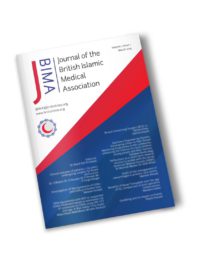
The word “unprecedented” has perhaps become the most overused word in the dictionary over the past 18 months or so, but no other word can so succinctly describe the rapid changes and continuing uncertainty Covid-19 brought. With the discovery of the new Omicron variant, it seems that the only certainty, is that matters will
remain uncertain for some time yet. And whilst the discovery of this new variant is deeply unwelcome news,
there can be little doubt that, Alhamdolilah, the world is better prepared now than in March 2020.
There is a huge amount that can be learned from past experiences. Mistakes were made by politicians and
policy makers, when we first faced the challenge of the pandemic, but we must remember the words of Prophet Muhammad PBUH who once said, A believer is not stung in the same hole twice”. The challenges that we face with the new variant are arguably greater however. The world economy has been suffering over the past 18 months with millions struggling with unemployment and underemployment. Lockdowns have an adverse effect on the mental health of individuals and isolate many. People are fed up with restrictions and understandably, don’t want to give up the semblance of “normality” they have gained since the summer. But the new variant seems to be more infectious than others, and less affected by the vaccines (though it is still weakened by them).
This all means that we simply must be ready for possible another lockdown and further restrictions. Lockdowns are unpopular and imperfect solutions but their effectiveness in cutting the chain of transmission and infection is ruthlessly effective. Should further restrictions be implemented, it is important for us to follow them, and to ensure our family and friends do so. Staying at home could save lives, and the pandemic has made clear that the fact that so many Muslims are amongst the BAME community, we tend be at higher risk from Covid and any complications of the disease. It is also worth bearing in mind that as the vaccination rates are thankfully on the rise in the UK, the same cannot be said around the world due to vaccine nationalism. Poorer countries have far lower vaccination rates but ultimately, we are not safe until everyone around the world is safe
Vaccines must be distributed equitably around the world.
We are thankfully in a stronger position than March 2020 due to our better understanding of the disease and the
successful vaccination programme. There is irrefutable evidence that the vaccines have protected thousands and we must continue to advise our patients to be inoculated, but there are also worthwhile conversations to be had about mandatory vaccinations for frontline NHS workers. It is not a stance that everyone agrees, even those who are strong proponents of the vaccine, but it is understandable that it is being discussed and we have two
interesting pieces on mandatory vaccinations for healthcare workers in this issue of JBIMA.
And whilst Covid overshadows everything, we cannot forget the issue of assisted dying which has been a hot
topic over the past few months and shows no signs of abating. As Muslims, we believe in the sanctity of life and how it is only Allah that has the right to take life away, the same way he gives life. We have two articles on this topic, and we hope they’ll open discussion amongst the community. This is particularly relevant after the BMA’s unfortunate stance on the matter where they state they are neutral and allows those who do not subscribe to the Muslim faith to consider our perspective.
All the best, Wassalamo Alaikom
Dr Sharif Al-Ghazal,
JBIMA, Editor in Chief
Editorial

